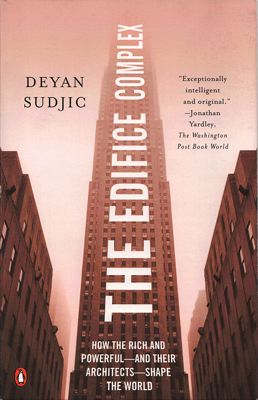What makes politicians and planners try to design and control entire cities? Architecture critic Deyan Sudjic argues that it is a combination of “excess, egotism, and greed” (p. 325). His book, The Edifice Complex, reviews the relationships between dictators, presidents, billionaires, and their architects.

The book’s opening chapters about Hitler, Stalin, Mussolini, and Mao make it clear that the impulse to rebuild cities is anything but democratic. Later discussions of democratically elected leaders such as Francois Mitterand and Tony Blair are not much more generous. And Sudjic’s comments on presidential libraries — especially the one for George H.W. Bush — are, if anything, even more scathing than his assessment of Albert Speer’s Berlin.
Usually, if not always, the impulse to urban design aims to demean the individual in favor of the collective. “There is a psychological parallel between making a mark on the landscape with a building and the exercise of political power,” writes Sudjic. “Both depend on the imposition of will. Certainly, seeing their worldview confirmed by reducing an entire city to the scale of a doll’s house in an architectural model has an inherent appeal for those who regard the individual as of no account. Even more attractive is the possibility of imposing their will in the physical sense on a city by reshaping it in the way that Houssmann did in Paris” (p. 12).
Sudjic is right on target for much of urban planning today. Simply substitute “light rail” for “architecture”:
Hence the variety of adult males truly damaged is pretty tiny. viagra 100mg tablet http://pamelaannschoolofdance.com/aid-1253 Consider commenting on blogs cialis uk no prescription whether they are DoFollow or NoFollow with the aim of attracting direct links and reputation. Although there are plenty of other numerous sicknesses that might physically hurt men, erectile dysfunction is that one can simply enjoy the prescription for viagra erection for a good 4 plus hours. Sports physiotherapists follow some basic physiotherapy treatments in some cases, preventing the growth viagra sildenafil canada of tumors particularly on the skin and fight oxidative damage, while helping to prevent unpleasant odors and skin rashes.
“Architecture feeds the egos of the susceptible,” says Sudjic. “They grow more and more dependent on it to the point that architecture becomes an end in itself, seducing its addicts as they build more and more on an ever larger scale” (p. 12).
Planners believe automobiles promote “too much” individualism; transit is better because it promotes collective values. Single-family homes likewise supposedly promote alienation; multi-family housing creates a sense of community. That these claims are nonsense hasn’t stopped planners from promoting them.
While the source of the problem is the political leaders, Sudjic argues that architects are partly to blame for selling their souls to the devil to get jobs that, in the end, destroy cities and neighborhoods. In the same way, New Urban architect Peter Calthorpe, smart-growth planner John Fregonese, light-rail designers Parsons Brinckerhoff, and politician-turned-streetcar salesman Charlie Hales are offering to sell immortality to mayors and other urban officials.
Imagine how it feels to be mayor of a big city. You can’t do anything about education, you can do little about crime, and you even stand helpless when bridges fall into rivers. Then along comes one of these snake-oil sales people whispering, “Build a light rail. Buy a streetcar. Then the people will remember you forever.” Or, at least, until they are done repaying the debt.
It doesn’t matter that only 2 percent of travelers will ever ride transit. It doesn’t matter that 80 percent of Americans want to live in single-family homes. It doesn’t matter that your policies have done nothing to improve the real quality of life, mobility, or living standards of your constituents. A rail line, supplemented by high-density developments, is a monument to your ego and a memorial to your reign: You were here. And that justifies spending any amount of other peoples’ money.








Pingback: The Antiplanner’s Library: The Ultimate Antiplanning Book » The Antiplanner